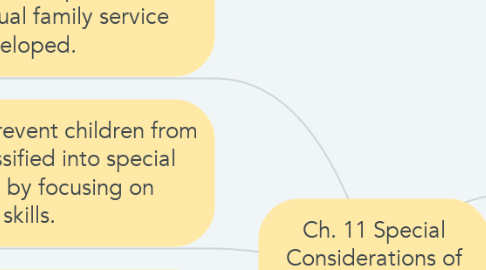Ch. 11 Special Considerations of Assessment in Early Childhood
by Lucia Kinford

1. Infants and toddlers from birth to age 2 who experience developmental delays in cognitive development, physical development, communication development, social/emotional development, and adaptive development are eligible for services.
2. The 1997 IDEA amendments define evaluation as the ongoing procedures used by qualified personnel to determine the child's eligibility for special services and continued eligibility while the child is served under this law.
3. The regulations require that and IFSP (individual family service plan) be developed.
4. RTI can prevent children from being classified into special education by focusing on emerging skills.
5. There are many instruments used to assess young children like: Mullen Scales of Early Learning, The Wechsler Preschool and Primary Scale of Intelligence Fourth Edition, AGS Early Screening Profiles, Kaufman Survey of Early Academic and Language Skills, BRIGANCE Early Childhood Screen III, etc.
6. The best practice of assessment across all ages of children involves multiple measures, multiple examiners, and multiple situations/ environments.


